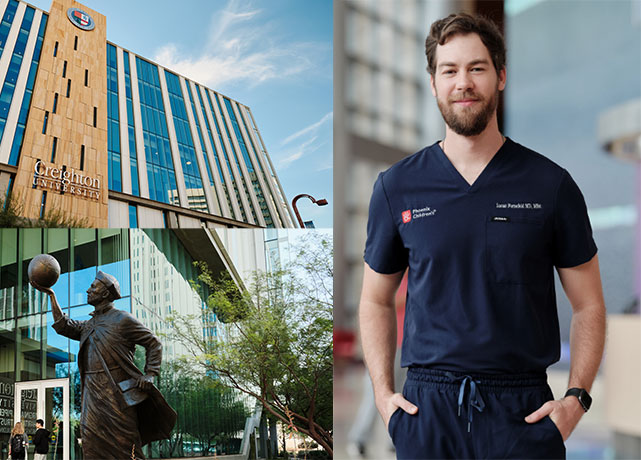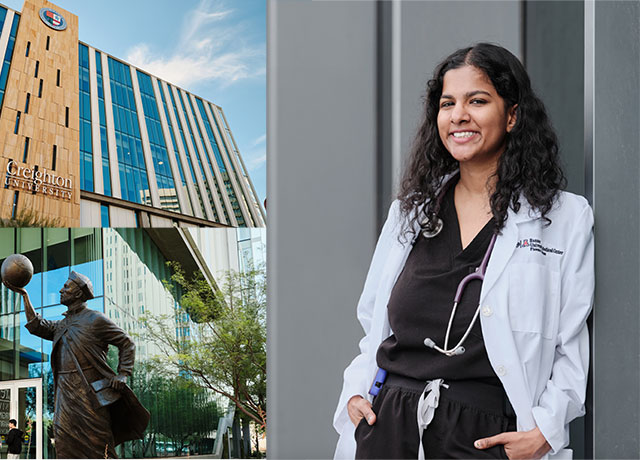Featured Testimonial About Creighton University
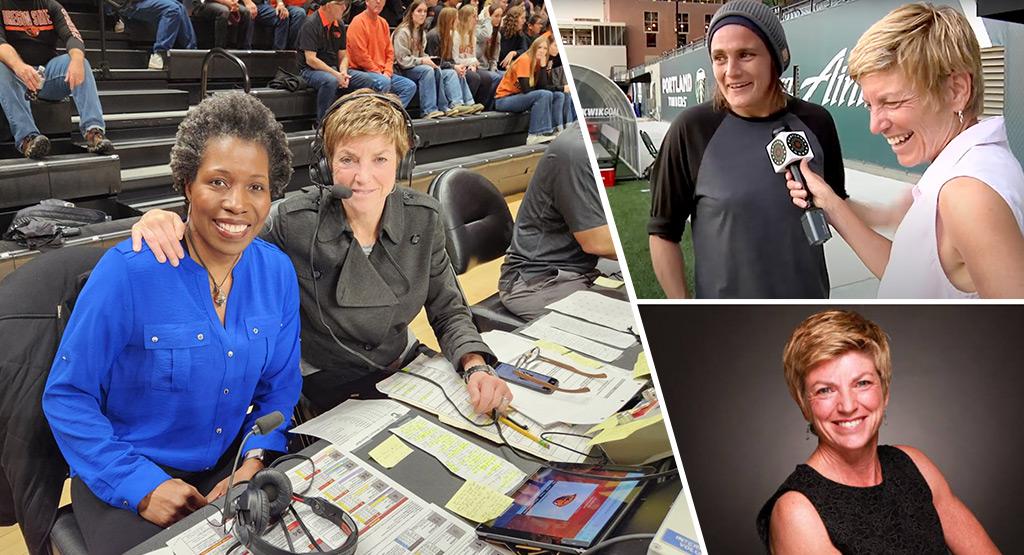
I had to be better than the guys, smarter than the guys, more accurate than them. I had to think differently. I had to be more creative, more curious, more clever.
By Jon Nyatawa
Creighton alumna Ann Schatz had her resume in hand when she arrived at the TV station. There were no job openings. But her dad told her to show up anyway.
If she had any inkling of the possibilities of her future career success — how she’d become the first woman sportscaster in Omaha and in Portland, the reporter who scooped everyone on the Tonya Harding story, an Emmy-award winning play-by-play broadcaster – Schatz would not have been at all hesitant that day.
But Schatz, BA’79, did not have a dream job in mind. There was nothing to dream about.
Sports broadcasting in 1979 wasn’t an industry for women.
“When I graduated, it was, ‘Yay!’ I got good grades. I graduated on time, but there was a dark hole in terms of what might be next,” Schatz said. “There was no goal, no aspiration. There was just a lot of uncertainty because there was nothing in front of me to aspire to.”
But she took a chance, and her life soon changed.
KMTV in Omaha created a spot for Schatz and offered her a part-time weekend role. She soon moved into a full-time gig. Then she became the weekend sports anchor. Then the main weekday sportscaster. Then a job offer from Portland TV station KOIN. She later transitioned into a play-by-play announcer, color analyst and sideline feature reporter for multiple national entities. During the course of her 40-year career in sports broadcasting, Schatz has covered the Olympics, World Series, the Boston Marathon, the Olympics, NBA, WNBA, NWSL and major college men’s and women’s sports.
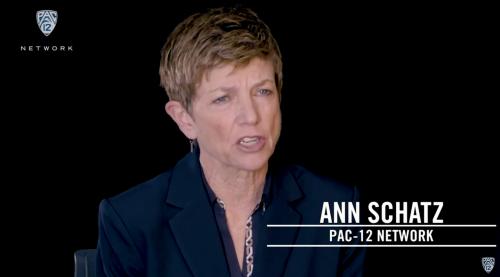
In 2022, Schatz received a Northwest Regional Emmy® Award for her excellence as a play-by-play broadcaster. She was the first woman to win the award in the Northwest Chapter's sports play-by-play category.
“I could not have imagined this — never in a million years,” Schatz said. “I am filled with gratitude and, well, amazement. I just shake my head. I'm telling you, I can't be more grateful for the path that I've been able to follow.”
The journey had its perilous moments, certainly. Schatz’s skills as a storyteller and orator are unquestionably exceptional, but she had to prove herself. Over and over again.
In the early days of her career, she heard rude comments from fans in the stands and TV viewers. She was hard on herself. She didn’t always feel comfortable.
“There were times that I'd go home and just cry,” Schatz said. “The things people said broke my heart, and it really crushed my spirit on occasion.”
She hadn’t then considered herself a pioneer or a trailblazer. In her mind, she was simply pursuing her passion.
But it was impossible to ignore the fact that wherever she went on the job — the editing room, a press conference, a practice — she was the only woman.
“My successes were celebrated, yes, but my mistakes were highlighted,” Schatz said. “For me, I had to be better than the guys, smarter than the guys, more accurate than them. I had to think differently. I had to be more creative, more curious, more clever.”
Her experiences at Creighton helped with that.
For one, she played two sports. So, she could always relate to athletes and uncover new perspectives on their approach to competition.
As a student, Schatz was always encouraged to ask questions and remain curious. This helped her develop her foundation as an interviewer and a journalist.
“I remember the journalism department was a very safe place for me,” Schatz said. “I had no idea what I was going to do with my degree, but Creighton gave me camaraderie and it gave me inclusion. The faculty really made you feel like you could do something with a degree if you just gave it a little effort. I have a lot to be grateful for with Creighton.”
Creighton helped Schatz prepare to maximize her talent and impact.
Then her dad gave her the extra, final push.
“I was living at home with dad after my mom died before my senior year of college, and we were trying to figure out grief and gratitude and how to march along,” Schatz said. “I remember one day he said to me, ‘Honey, by the time I get home from work tonight, I want to know that you have gone to the three television stations with your resume, and I want you to apply for jobs.’”
Schatz took her dad’s advice. All three TV stations turned her away. But a few days later, KMTV called back. And Schatz never looked back.
A few additional notes on Schatz’s career:
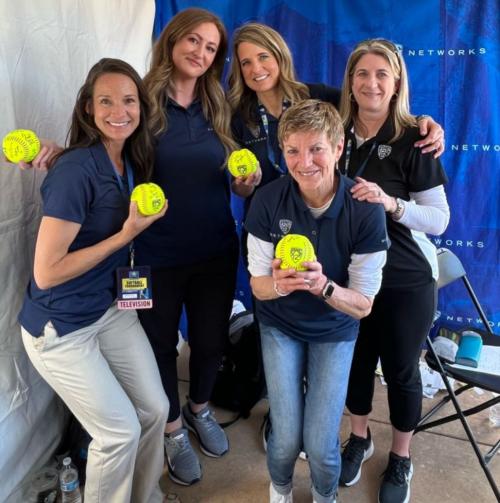
>> Schatz has called games for the Pac-12 Network since its launch in 2012. The Pac-12 Conference dissolved this offseason, but Schatz helped fans and schools celebrate countless historical moments in multiple sports through the years.
>> While working for KOIN in Portland, Schatz earned well-deserved acclaim for covering Tonya Harding and her 1994 controversy with figure skating rival Nancy Kerrigan. Schatz got the first one-on-one interview with Harding. Said Schatz: “Keeping that story clean with her was huge for me. It was me not judging her, not thinking I knew the truth, not trying to lead her down a path. I never felt like pursuing and getting interviews with her was a game.”
>> One of Schatz’s highest-profile interviews: Michael Jordan. The first time she interviewed him — in the locker room before an NBA exhibition game his rookie year — is the one she remembers most.
“He was not Mike; he was not Air Jordan. Not yet,” Schatz said. “It was as if the story was out there for someone to tell, and he'd tell it, but not that night. He was just a rookie hoping to have a good game. I will always remember that.”
>> When channel surfing through sporting events during her TV-watching downtime, Schatz often stops in her tracks when she hears a woman’s voice calling play-by-play. It happens much more these days.
“It brings me so much joy to see women getting those opportunities,” Schatz said. “And in a small way, I get to say, ‘Gosh, I hope I helped.’ I don’t know if I did. Really, at the end of the day, does it matter? What matters is that they're in the booth at this time and there's much to celebrate in what they represent and what's in store for the next generation and our representation in the broadcast booth.”

